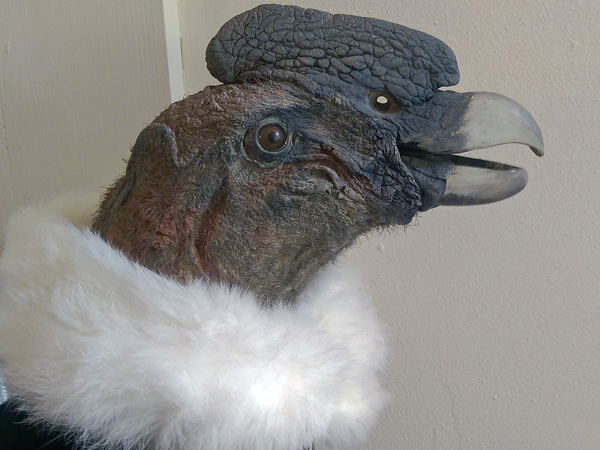Puppet plays a part in parenting a condor at the ICBP

A beautifully crafted condor puppet helps give a baby condor chick the best start in life.
Breeding is one of the very important areas of work that the International Centre for Birds of Prey is involved in, both in the UK, and across the world.
We have a successful breeding programme here at the centre, and also advice and support many conservation breeding programmes across the world.
We take our breeding responsibility seriously and take care not to breed species that we can’t house or find suitable homes for.
Sometimes circumstances mean that we have a bird bred that cannot be parent reared as was expected.
We have just had made a bespoke condor puppet by a talented craftsman called Carl Church to help us rear a baby condor that cannot return to its parents.
Many young animals and birds display phase-sensitive learning, or learning occurring at a particular age or life stage. This is also known as imprinting. This means that a young animal or bird will follow a particular stimuli – usually whatever it’s sees a lot of and so sees it as a parent figure. Over time, the young will also emulate the behaviour of what it has imprinted to, as it sees this as ‘normal’ or characteristic.
Unless a bird is to be hand reared and imprinted, it’s important to try and prevent imprinting on people, but on another bird. This is to encourage the bird to grow up with as much as possible of the instinctive and natural behaviours that a bird in the wild would have.
Holly Cale, Curator and Breeding Specialist, said:
‘We have a great responsibility when breeding birds in captivity.
‘Some birds will be kept by our centre to join our flying team, and some birds will be re-homed in centres such as ours across the UK, and even overseas.
‘It is important that we ensure that all chicks are given the best possible start, sometime this can be challenging, for example with inexperienced parents. We employ different methods such as puppet rearing and crèche rearing to open as many options as possible for the young birds.
‘We are always looking for ways to improve the outcomes for these more challenging cases.’
Wherever possible, we would find a suitable foster parent to rear the chick if it is unable to return to its parents. For example Hemp, our Eurasian Eagle Owl is currently taking care of two orphaned Tawny Owlets. However occasionally this is not possible.
We currently have a baby Andean Condor who is unable to return to its parents. We are lucky to have two fabulous condors in our centre. But alone, neither are able to fully satisfy the role of suitable foster parent duties for our chick.
Real, our lovely adult Andean Condor, due to becoming egg-bound, has had an avian hysterectomy, and so does not have her natural breeding cycles anymore. This means she may not show the required maternal behaviour, and could be aggressive towards the baby.
Moccas, our Juvenile Andean Condor is both too young to offer suitable mature behaviour characteristics, and also is an imprinted condor, so her behaviour alone would not be an appropriate model.
In order to give our chick the best opportunity to grow as naturally as possible, we have placed it in an aviary next to Real, so it can see her all the time, and watch and mimic her behaviour. We have also screened off her aviary to the public for the time being to ensure she has minimal contact with people. In the wild, condors would be raised in seclusion, often seeing no other living thing except its parents for the first several months of its life.
Puppet-rearing alone cannot successfully take the place of a parent, as a puppet cannot offer a suitable role model for the chick. But by combining the visible presence of Real in the neighbouring aviary with the puppet delivering food sources, we are confident we can imitate the parent role as robustly as possible in the absence of a foster-bird.
Jemima Parry-Jones (MBE), Director, said:
“This is an exciting new development for us and not something we have done before with such a large and complex bird.
Our fabulous new puppet will now enable us to feed the baby chick as though from a parent condor. Carl Church (http://www.birdtaxidermy.co.uk) is a superb taxidermist, but also makes the most amazing models, we phoned him to ask if he could help and the end result of the puppet is just amazingly lifelike and just what we needed.
‘If we can successfully combine puppet-rearing with close visual continuity to rear a reasonably unaffected bird, this could offer important developments in captive breeding programmes for reintroducing birds to the wild across the world.’
Explore Gloucestershire
24 May 2017
For further information.
OTHER NEWS
